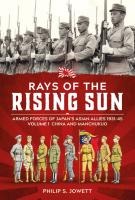When the Japanese Empire went to war with the Allies in December 1941, it had already been fighting in China for 10 years. During that time it had conquered huge areas of China, and subjugated millions of people. The Japanese needed to control the Chinese population in these occupied territories, and for this reason they set up governments from amongst the leaders of the Chinese who were willing to co-operate with them. These so-called 'puppet' governments were designed to rule on behalf of the Japanese while firmly under their overall control. In turn, the 'puppet' governments needed their own 'independent' armed forces. These 'puppet' armies were large in number, reaching a total of well over 1 million before 1945. Although poorly-armed and equipped, these forces had an influence on the Japanese war effort through sheer numbers.
The Chinese 'puppet' soldiers ranged from the well-drilled and trained regular Army of the Last Emperor of China, Pu Yi, who ruled the newly-formed state of Manchukuo, 1932-45, to the irregular Mongol cavalry who served alongside Japanese troops in the 'secret war' waged in the Mongolian hinterlands.
The troops were dismissed as traitors by the Chinese fighting the Japanese, and they were equally despised by the Japanese themselves. The troops were motivated by a range of reasons, from simple survival to a loyalty to their commander. The fact that so many Chinese were willing to fight for the Japanese was embarrassing to all sides, and for this reason has been largely ignored in previous histories of the war in the East. In the first of a three volume series, Philip Jowett tells the story of the Chinese who fought for the Japanese over a 14 year period.

